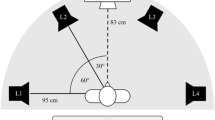Abstract
Negative priming is a decrement in performance observed when a previously ignored stimulus is re-presented as a target. The present study examined the relation between selection difficulty and negative priming in five experiments that used hierarchical stimuli (large letters made up by small letters). The results show that negative priming is greater when subjects direct attention to the local level (more difficult selection) than when they direct attention to the global level (less difficult selection). However, that occurs only when exposure of prime and probe is sufficiently long. With shorter presentations, negative priming is still observed but is no longer modulated by selection difficulty. These results suggest that both anticipatory and reactive mechanisms are responsible for the occurrence of negative priming and that instantiation of the reactive mechanism depends on the time available for prime and probe selection.
Similar content being viewed by others
Author information
Authors and Affiliations
Additional information
Received: 17 January 2000 / Accepted: 3 July 2000
Rights and permissions
About this article
Cite this article
Stablum, F., Ricci, R., Pavese, A. et al. Global/local processing and negative priming: the influence of selection difficulty and stimulus exposure. Psychological Research Psychologische Forschung 65, 81–97 (2001). https://doi.org/10.1007/s004260000046
Issue Date:
DOI: https://doi.org/10.1007/s004260000046




